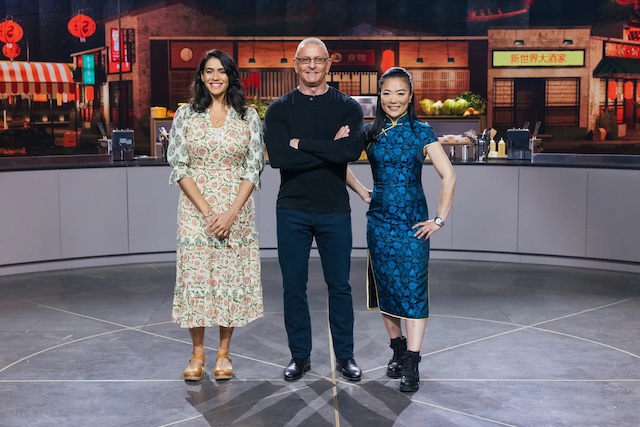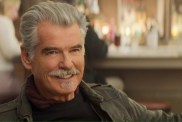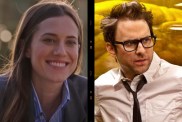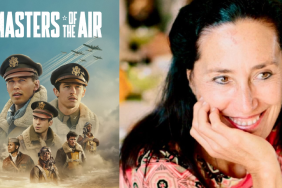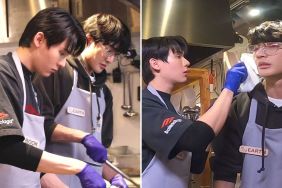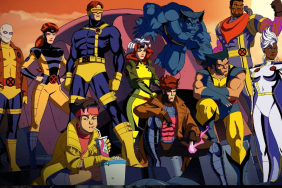Food Network star Robert Irvine’s latest cooking series is now streaming on Discovery+ and The Globe is unlike any other cooking show. The competition has chefs using ingredients and utensils from countries all across the world and showcasing local dishes. The limited series has five episodes in total and was birthed due to COVID-19 restrictions.
“In each episode of this globe-trotting series like no other, four talented chefs compete across three rounds of culinary gameplay as they are transported to the greatest food destinations around the world via immersive LED screen backdrops that have the chefs traveling the globe without ever having to leave the arena,” says the official synopsis. “Joining Robert on this global journey is award-winning chef Daniela Soto-Innes as resident judge, along with appearances from special guest judges at each destination with ties to the region.”
ComingSoon Editor-in-Chief Tyler Treese spoke to chef Robert Irvine about his latest show, how he came up with the idea behind The Globe, the importance of diversity, and the lessons we can learn from food.
Tyler Treese: How’d you come up with the idea for The Globe?
Robert Irvine: We went through COVID and I was traveling after I had COVID and spent six days in the hospital. I was back on the road, traveling and doing Restaurant Impossible: Back in Business. I thought, well, look at this. When you’re stuck at home, nobody can travel. Nobody can see the family, nobody can do the things that they want to do. How can we entertain them? I’ve always had this idea of The Last Supper [of the world], where every head of state in the free world will put their national dish on a table, take one bite and pass it to the right, and there will be no problems in the world because food is a great uniter and a great equalizer.
So I wanted to put that in the TV. I was doing a thing I do every year, Sky Ball, to feed all the veterans in Dallas, and we use a 270 degrees screen. I thought, wouldn’t it be great to give a bird’s eye view into a country, have authentic ingredients, but the chefs not know what the ingredients are. I mean really not know what they are. Picked out by the guest judges. So imagine this, unique ingredients from the country of origin, in other words, which country we go in, whether it would be Abu Dhabi, Kyoto, Lima, Peru, all these places in between, not tell the chefs where they’re going. Suddenly hit, take me to this place, out comes a pantry. By the way, you’re not only using ingredients you’re not used to, but we’re also gonna use utensils and cooking equipment that you don’t use too. And you have a time limit and you got to cook, but here’s the kicker. Not only do you have to cook in a time limit with all these unusual ingredients and equipment, you’re going to be judged by somebody that has ties or comes from that country.
So, Bricia Lopez, Dominique Crenn, 3-star Michelin chefs. I quake in my boots when Dominique walked into the [set]. I mean to cook for somebody of that level, that is really going to tell you: yes; no; this is wrong; this is right. The coolest thing for me is that I’m learning about food. Robert Irvine, who travels the world, whose been to most of these countries, is learning about food from those countries that he’s been to. And the viewer gets to take that journey, not only visually stunning with this great 270-degree screen, but with the food, with the judges, with the executive chefs, and these are real executive chefs in their own, right. They cook, they know how to cook, but do they know how to cook with these ingredients or this equipment?
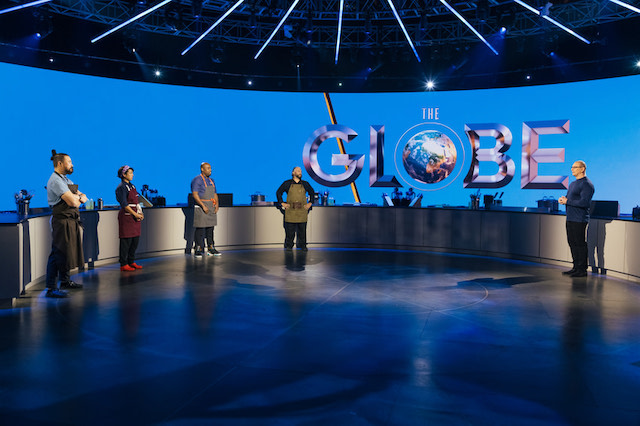
It’s such a great idea. You mentioned all the different types of foods you’re being introduced to. Has anything really stood out, like a type of food that was served, where you’re like, wow, I didn’t know I was missing out on this?
Well, I think there’s a lot of that, right? There’s four chefs going through three rounds each each episode and there’s grasshoppers. I just ate camel. There’s so many different things that culturally we would not even think about. I think enlightening a viewer or letting them take that journey and seeing the beauty of the country and the culture of the people is a whole new light. We’ve all seen cooking shows. You’ve all seen competitions. This is unlike any other competition. Not only with the judges. We didn’t hold any time clocks. We didn’t tell the judges what to say. I’m like you say what you feel, you feel what you say, and let the chefs cook because that’s what we do. So it was really exciting for me.
What’s so interesting and great about this idea. We are seeing these chefs, experts in their craft. They’re kind of a fish out of water scenario where they have to improvise with these ingredients they’ve never used before. As the host are you kind of glad that you’re just watching on the sidelines or would that challenge appeal to you?
I’ve traveled to these countries, I just came back from Abu Dhabi last week, and I’ve seen things that I played with, but in this competition, there’s so many new items. It really is an education that the judges are actually showing they’re picking the ingredients up and bringing them to me on a table and showing me what they would do with them, even making stuff on the table. It really is exciting. So I don’t think I would fair well, and I’m pretty good at what I do, but it’s not only the excitement and the new foods and the places, and the judges, it’s also the prizes for the winner of each episode. They get to pick, to go to visit with a friend or a wife or a husband or a spouse, whatever, to one of the places they cook from. So whether it’s Kyoto, Addis Ababa, Lima, Peru, they get a fully expenses paid trip to that place and an opportunity to go into the final, where you can win $25,000 to take on that trip. More importantly, the bragging rights and say, “Hey, we beat everybody and this is how we did it.” I think it was really cool.
One of the themes I really like about The Globe is that people are exchanging cultures through food, and that’s something that’s very true to life as well, even just regional variants. I might prepare like a dish different from somebody from New Orleans or vice versa. Your wife, Gail Kim, she had a very different upbringing from yourself. Have you been able to kind of introduce each other to different foods and cultural variants?
Absolutely. It’s so funny because I would never eat spice. I’m not spicy, I’m a sweet person. Not in personality, but I love sweets. So Gail does not, she doesn’t like sweets. She is all about spice and flavor. So she has taken me to a whole different level of that. I’ve tried to get her to do sweets. When her mother comes to visit us and I get to cook Korean, it’s a whole different way and I really appreciate it.
I’ve gotten to appreciate, also in the last couple of years, the diversity of the human race, right? Everybody’s different and it’s okay to be different and it’s okay to try something new. If you don’t think it goes well, by the way. Oh, it does. Why? Because they do over in Japan or they do it in Iraq. Well, they do it in Abu Dhabi, and I think that’s the beauty of this show. There’s no bar, there’s no limits. It is what it is. We’re giving you the best ingredients possible. It’s so funny because when I send them to a location on this big jumbo screen, 20 million pixels of high def beauty, then I roll out the pantry so they don’t get to see any ingredients. So I tell them where they’re going, I roll out the pantry, they don’t get to look at it. I get to say go, and they go, and that’s no other competition by the way.
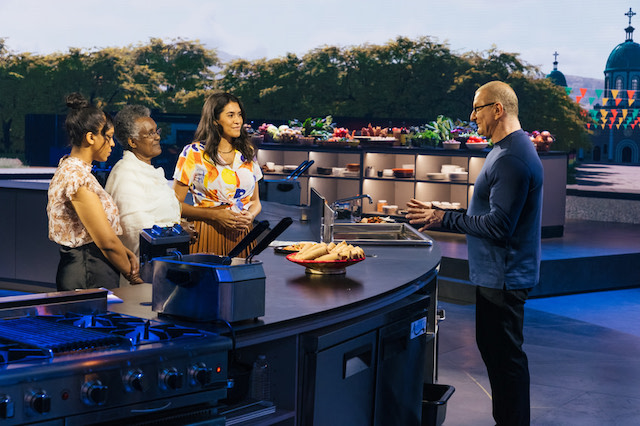
I’ve seen a lot of cooking shows, nothing seems like this.
It’s real. It’s real, and I’m very proud of it. I use this analogy of The Last Supper, we could put every head of state around the table and let them try that food. I said this to you, but it’s about diversity. It is about education. It’s about food being the uniter of people. That’s what this show is. And you can sit in your living room, visit countries you’ve never even heard of or seen before, and experience something that is unique.
You keep mentioning this Last Supper idea. What would you choose to represent England?
So funny. I think it would be Indian food. I know people say to me, well, the Indian isn’t English. Yeah, it is. And so is it Chinese. A Curry didn’t originate in India. It came from China. So I think England is one of the most diverse countries in the world. I grew up on, you know, Monday, Monday shepherd’s pie, Friday fish and chips, and on Saturday curry. I think it’s time that we celebrated that.
One of my favorite things is they’re not cooking just for chefs, you bring in people from the local places. It’s interesting because they might not have a like clinically refined palate, but they know what is authentic and that’s such an interesting thing.
I love that you just said that because I have a 69-year-old female, who’s been cooking this food all her life for a family and whatnot, and she’s judging. She’s not on television. She’s judging on what she knows that food and her country and that is what I love. It’s real people, real ingredients, and real challenges. There’s no chef, and this is me talking to you, and people think that chefs know, and on TV, we make them out to know everything. We don’t. It’s not real. We don’t know some ingredients. We don’t know how to prepare them. We have to figure it out. That’s the beauty of this show. If anybody tells you that they know everything about foods. I don’t want to talk to them because that’s not real. We don’t know. We know we are limited in our knowledge and we have to continue to learn. That’s what this is all about. Culture, food, and learning education.
